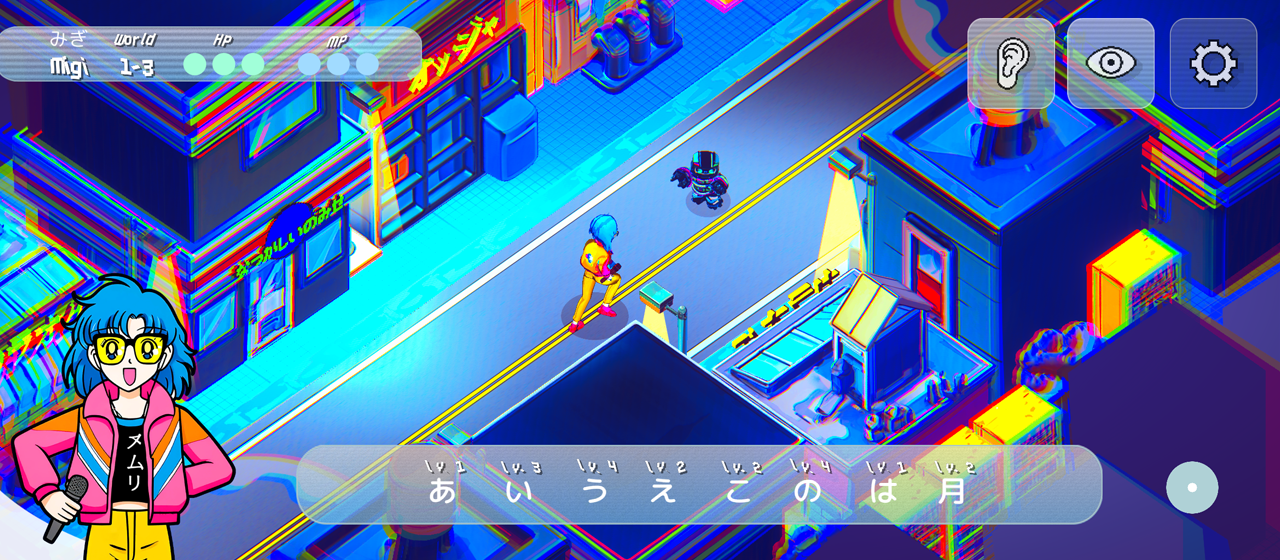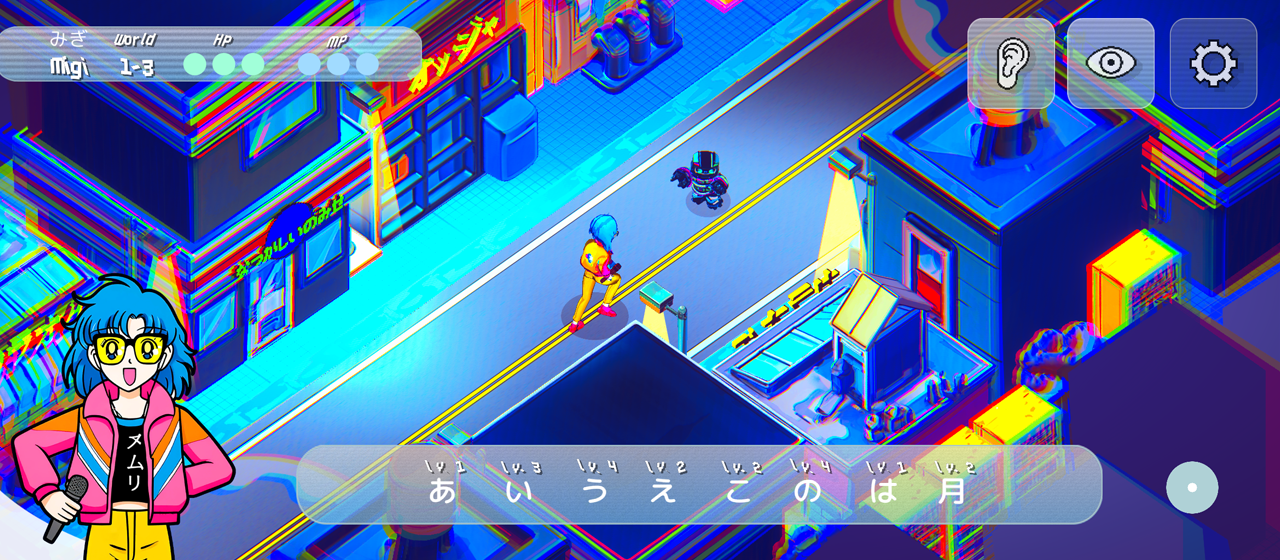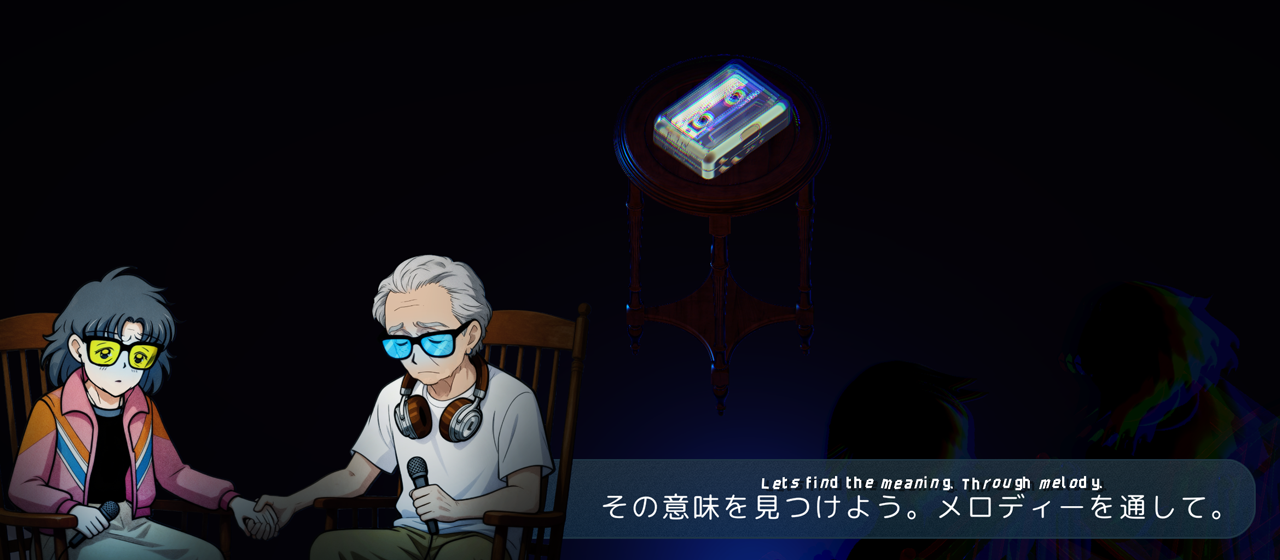ART GAME: BENJAMIN POYNTER’S MEMORY TAPES (2025): KARAOKE, LANGUAGE LEARNING, AND MIXED REALITY AUTOFICTION

Benjamin Poynter has spent more than a decade using game engines as instruments of introspection. From the VR allegory Story Generating Apparatus to the machinima-adjacent CHEnd and the arcade installation Everything Not Saved Will Be Lost, his projects trade adrenaline for memory and self-narration. With Memory Tapes | Immersive and Mixed Reality Language Learning Gameplay (2025), he makes that concern disarmingly pragmatic: a Japanese-learning mobile game, driven by music and karaoke, about an elderly couple trying to remember why life still matters. (We last featured his work in 2012)
Poynter describes Memory Tapes as a “special Japanese language mobile game… and self-exploration driven by music and karaoke.” The project grows out of four to five years spent studying Japanese through karaoke in Los Angeles, Tokyo, Osaka and Kobe, performing a corpus of 125 songs in hiragana, katakana and kanji, often at Lounge Ohjah in Little Tokyo and at karaoke bars across Japan. That practice produced what he calls “valuable and personal” results: long-term relationships, a shift from non-singer to singer, multiple trips to Japan, and a renewed connection to his position as a fifth-generation Japanese-American. The “data” of Memory Tapes (lyrics, recordings, mispronunciations, gradual improvements) are inseparable from that lived experiment.
Rather than simply narrating his own experience, Poynter filters it through an elderly couple who dive back into their deepest musical memories in an “uncertain world.” Asked why he chose that proxy, he explains:
“I feel in the act of reaching something I could be through familial proxy, it seemed appropriate to reference a generation’s past and view it through a modern lens. Narratively and aesthetically I feel the couple address the concept of remembering days past in an uncertain present. As well, through some of the bonds and relationships I’ve forged in my search, I feel the character demographic matches identities that have influenced that way of thinking.”
The framing creates a productive distance: the game is grounded in his biography without collapsing into confession. The couple voice concerns that are Poynter’s and also not his, echoing the elders, friends and hosts who sustained that karaoke-based study.
On the surface, Memory Tapes looks like a recognisable language app: an interactive learning interface for Android, built in Unity and deployed on a Samsung Galaxy S21. Underneath, it behaves more like an autobiographical essay written in camera feeds, microphones and signal processing. The premise is simple. An older couple decide to re-enter their musical past; each lesson becomes a small episode structured around a song, a scene, a fragment that once defined them. The player’s actions (listening, repeating, reading, scanning, singing) have a clear pedagogical function, but the real tension lies in whether the couple can reach a “nostalgic, blissful finale,” a modest pocket of consolation inside a destabilised present.

Because the project is rooted in karaoke, listening and vocal performance sit at the core of the design. Memory Tapes is built as a mixed-reality interface: the phone’s camera and microphone are as important as its GPU. Optical character recognition via Tesseract, automatic speech recognition through Whisper, and Ruby text overlays pull the outside world into the lesson plan. Street signs, record sleeves, handwritten notes, karaoke subtitles, even the scrawl on a Little Tokyo menu can be conscripted as prompts. On the audio side, Poynter layers Suno-based composition, samples from Freesound and Mixamo-derived motion with licensed fragments such as Kirinji’s “Killer Tune Kills Me,” a J-pop staple about being consumed by a melody that refuses to fade. The choice is pointed: a song about obsessive listening becomes a micro-model of how Memory Tapes treats music as a trigger for recall.
The title is literal. Each song functions as a “tape”: a unit of memory and a record of practice. The program allows users to revisit those tapes track by track, using embedded tools to unpack phrases, identify recurring structures and build shared meaning across songs. Inevitably, this raises the question of structure.
Does the game preserve the chronology of his own learning or reshape it?
Poynter notes:
“I believe there will be an assembly that more closely matches the structure of a game and learning pattern. It’s one of those instances that actually points back to the first question! When do my own experiences lend to an objective piece and when does it stop mattering for the player or viewer? I feel the answer will definitely be to make it more objective for the player or viewer's sake. As well, my chronological ordering of songs does seem obtuse at times. Early on, I memorized a Japanese rap song where by the end it was taking it easier with more simple songs! I find, in the end, simpler songs would most likely allude to a more formal learning experience and something easier through game to derive from. Even though in Memory Tapes, through initial prompt and composition I made the music in that piece using existing Japanese knowledge.”
Autobiographical material is thus treated as a dataset to be reorganised in favour of legibility and pedagogy. The “tapes” retain their origin in his own study, but their sequence is re-authored to support players who did not share that specific path.

The affective charge of the project is condensed in what Poynter calls “karaoke magic.” Asked for a concrete example, he recalls:
“At the karaoke lounge referred to, I performed a song called Hanabi (i.e. Fireworks) by Mr. Children on New Years Eve right before the fireworks of the new year. It was an epiphany type moment of a lot of personal hard work and study coming together at the perfect moment of lyrical content, context, and I would have to confirm karaoke magic. Song choice matters a lot for me and I’m sure others when it comes to those moments. Another few would be me giving a full lecture on karaoke at Nerd Nite LA, filing for a patent related to karaoke, or hanging out with the manager of the Lounge Ohjah in Kobe, Japan. While karaoke could be thought of as a more niche pastime, the ways in which it can envelop peoples’ lives for the better really does have a way”
That incomplete final phrase captures something essential about Memory Tapes: the sense that these performances run ahead of any neat summary. Karaoke is treated as more than entertainment; it becomes method, archive and social glue, a way of letting “someone’s soul shine forth,” as Poynter writes on his website.
This stance puts Memory Tapes sharply at odds with dominant language-learning platforms. Where Duolingo and its peers rely on streaks, XP ladders and leaderboards, turning study into an attention-economy grind, Poynter opts for slowness. There are no cartoon mascots issuing passive-aggressive prompts, no threats of losing progress for missing a day. The pressure is narrative and affective: skipping practice means leaving two elderly characters trapped in unfinished remembrance. Repetition is still central, but it is embedded in scenes of listening, care and occasional epiphany rather than in micro-bursts of points.
Poynter borrows tools marketed as frictionless productivity (speech-to-text, computer vision, generative sound) and bends them toward a story about care, nostalgia and bilingual stumbling. The game proposes that meaningful uses of AI in interactive art may hinge less on spectacle than on small shifts in everyday habits: how we read a sign, sing along, or conjugate a verb while trying to remember the first time we heard that song.
Benjamin Poynter is a game designer, artist and writer based in Los Angeles. He holds a BFA in Media Arts from the University of Oklahoma and an MFA from the University of Nevada, Reno. His independent games and VR works have been presented at venues such as IndieCade, UCLA Game Art Festival and the International Mobile Gaming Awards, and he has contributed to large-scale immersive projects in Las Vegas, including a central role in the design of the MSG Sphere. Across gallery installations, mobile projects and experimental simulations, Poynter treats game engines as tools for excavation, of memory, identity and the so-called “default world.”
All images and videos courtesy of Benjamin Poynter
